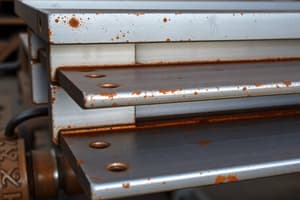Podcast
Questions and Answers
What is the primary property of mild steel that allows it to be used in structural engineering?
What is the primary property of mild steel that allows it to be used in structural engineering?
- Friction resistance
- High elasticity
- Linear and elastic behavior below yield point (correct)
- Low tensile strength
Young's Modulus is the relationship between stress and strain in materials.
Young's Modulus is the relationship between stress and strain in materials.
True (A)
What happens to mild steel when the stress is increased beyond the yield point?
What happens to mild steel when the stress is increased beyond the yield point?
It behaves nonlinearly or plastically.
The equation that relates stress to strain in mild steel is 𝜎 = 𝐸𝜖, where 𝜎 denotes ________.
The equation that relates stress to strain in mild steel is 𝜎 = 𝐸𝜖, where 𝜎 denotes ________.
Match the terms with their definitions:
Match the terms with their definitions:
What characterizes a material that is in the elastic range?
What characterizes a material that is in the elastic range?
Once a material reaches its ultimate strength, it cannot fracture.
Once a material reaches its ultimate strength, it cannot fracture.
Who was the mathematician that initially proposed the idea of elastic modulus?
Who was the mathematician that initially proposed the idea of elastic modulus?
What effect does increased carbon content have on steel?
What effect does increased carbon content have on steel?
Cold-formed steel is less expensive than hot-rolled steel.
Cold-formed steel is less expensive than hot-rolled steel.
What is the primary element in stainless steel responsible for preventing rusting?
What is the primary element in stainless steel responsible for preventing rusting?
Hot rolled steel is primarily used in applications where _____ dimensions aren’t crucial.
Hot rolled steel is primarily used in applications where _____ dimensions aren’t crucial.
Match the type of steel processing to its primary characteristic:
Match the type of steel processing to its primary characteristic:
Which of the following is a drawback of hot-rolled steel?
Which of the following is a drawback of hot-rolled steel?
Cold working of steel always decreases its yield strength.
Cold working of steel always decreases its yield strength.
What is the typical minimum size for a hot-rolled steel tube mentioned?
What is the typical minimum size for a hot-rolled steel tube mentioned?
What is the yield strength of steel grade S275 for thicknesses greater than 16 mm and less than 40 mm?
What is the yield strength of steel grade S275 for thicknesses greater than 16 mm and less than 40 mm?
Steel is weaker in compression than in tension.
Steel is weaker in compression than in tension.
What is the range of carbon content in mild steel by weight?
What is the range of carbon content in mild steel by weight?
The symbol __ is generally used to refer to stress in engineering.
The symbol __ is generally used to refer to stress in engineering.
Match the following steel grades with their yield strengths for thicknesses less than 16 mm:
Match the following steel grades with their yield strengths for thicknesses less than 16 mm:
Which of the following statements about ductile materials is true?
Which of the following statements about ductile materials is true?
Mild steel is also known as low carbon steel.
Mild steel is also known as low carbon steel.
Describe one advantage of steel's ductility.
Describe one advantage of steel's ductility.
Flashcards are hidden until you start studying
Study Notes
Steel Properties
- Steel is generally a better engineering material than cast iron.
- Mild steel is used in everyday structural engineering.
- Steel’s stress-strain relationship is linear and elastic below the yield point (𝜎𝑦).
- Young's modulus (𝐸) defines the relationship between stress (𝜎) and strain (𝜖) in the elastic range, described by equation 2.1: 𝜎 = 𝐸𝜖.
- Beyond the yield point, steel exhibits nonlinear or plastic behavior, meaning it permanently deforms.
- Steel is generally ductile, meaning it can stretch significantly before fracturing.
- This ductility provides a considerable warning before failure, unlike brittle materials like concrete or cast iron.
- Steel behaves similarly in tension and compression, unlike concrete that is much weaker in tension.
- Mild steel is low carbon steel (0.05%-0.25% carbon by weight).
- Hot rolling is the common manufacturing process for steel sections.
- Hot rolled steel undergoes slight shrinkage during cooling, making it less suitable for high-precision applications.
- Cold-formed steel is hot rolled steel further processed after cooling, offering better finish, accuracy, and strength through work hardening.
- Cold-formed steel is used for precision applications, thinner sections, and steel sheeting.
Steel Grades and Yield Strength
- Structural steels are categorized by their yield strength (𝑓𝑦) in 𝑁/𝑚𝑚2.
- Common structural steels include S235, S275, S355, and S440.
- Yield strength varies based on the thickness (𝑡) of the steel section.
Eurocode and Steel Design
- Eurocode uses 𝑓𝑦 to denote yield strength, while engineers typically use 𝜎.
- This course focuses on hot rolled steel sections, so when referencing codes and standards, one should look at the ‘Hot Rolled’ steel sections.
Studying That Suits You
Use AI to generate personalized quizzes and flashcards to suit your learning preferences.




